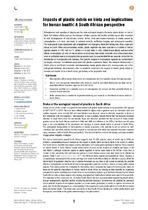| dc.contributor.author | Naidoo, Trishan | |
| dc.contributor.author | Rajkaran, Anusha | |
| dc.contributor.author | Sershen, Naidoo | |
| dc.date.accessioned | 2020-11-10T08:02:01Z | |
| dc.date.available | 2020-11-10T08:02:01Z | |
| dc.date.issued | 2020 | |
| dc.identifier.citation | Naidoo, T. et al. (2020). Impacts of plastic debris on biota and implications for human health: A South African perspective.South African Journal of Science, 116(5-6),7693. Doi: https://doi.org/10.17159/sajs.2020/7693 | en_US |
| dc.identifier.issn | 0370-8462 | |
| dc.identifier.uri | http://hdl.handle.net/10566/5399 | |
| dc.description.abstract | Entanglement and ingestion of plastics are the main ecological impacts of marine plastic debris on marine biota, but indirect effects such as the transport of alien species and benthic smothering are also important to note. Entanglement of invertebrates, sharks, turtles, birds and marine mammals is mainly caused by macroplastics (>5 mm), and leads to reduced mobility, ineffective foraging and subsequent mortality. The main plastic types associated with entanglement are improperly discarded fishing nets, lines, ropes and straps. | en_US |
| dc.language.iso | en | en_US |
| dc.publisher | South African Assn. For The Advancement Of Science | en_US |
| dc.subject | Pollution | en_US |
| dc.subject | Microplastic | en_US |
| dc.subject | Entanglement | en_US |
| dc.subject | Ingestion | en_US |
| dc.subject | Ecology | en_US |
| dc.title | Impacts of plastic debris on biota and implications for human health: A South African perspective | en_US |
| dc.type | Article | en_US |

